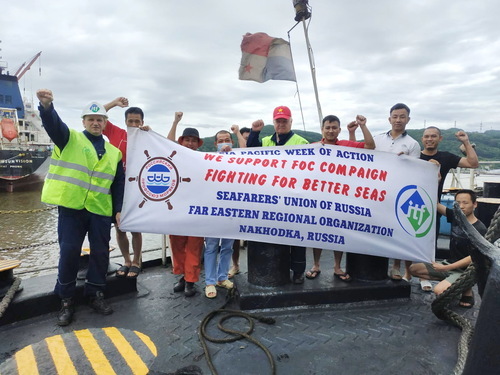ÐÎÑÑÈÉÑÊÈÉ ÏÐÎÔÅÑÑÈÎÍÀËÜÍÛÉ ÑÎÞÇ ÌÎÐßÊÎÂ
SEAFARERS' UNION OF RUSSIA
A NON-UNIONIZED SEAFARER
IS AN UNPROTECTED SEAFARER
Back
There is no ITF collective agreement on board the m/v VF Glory

Today the Inspectors of Far Eastern Territorial Organization of the SUR have visited the m/v VF Glory, berthed at the sea fishing port of Nakhodka and found out that there was no collective agreement of the International Transport Workers Federation on board. A good thing that at least insurance certificates, required in accordance with the Maritime Labour Convention 2006, were available on board the VF Glory (flag of Panama, IMO 9486271, dwt 8442, 2008 built). The registered owner of the vessel is the Seoul company Philocean Line SA , the operator and the beneficial owner of the ship, who signed the Declaration part II, and pays the wages to seafarers - the Hanoi company Vietnam Ship Service JSC. All 18 crew members are Vietnamese seafarers. The FETO SUR Inspectors have already met the captain of VF Glory: in February 2019 when he served as a captain either, but on board another vessel - Rainbow Symphony, operated by the same Vietnamese company.
According to him, when FETO SUR Inspectors visited his vessel in 2019 the company raised the basic wage for AB seaman from $660 to $1,000 and increased the insurance amount in case of a crew member death from $15,000 to $150,000.
Taking this, the seafarers expressed their gratitude to the representatives of the SUR and answered all questions about working conditions on board.
- The crew have told us that the AB Seaman salary is USD1,700, and the salary for the captain is USD 6,200. All seafarers have individual contracts, which specifically indicate the amount of the seafarer's salary and the amount of compensation in case of death, - says Nikolay Sukhanov, FETO SUR Chairman.
The trade union representatives have explained the crew members gathered in a mess-room that the flag of Panama under which the m/v VF Glory is registered is a flag of convenience, though the owner of the ship is a citizen of South Korea. This means that seafarers working on board the vessel under a flag of convenience have to rely not on the legislation of their country, of which they are citizens, but only on the decency of the shipowner. Flag of Convenience countries have weak or no maritime recruitment legislation, regulatory mechanisms, relevant authorities and political preconditions for their development.
The FETO Inspectors told the crew about the role of the ITF in the fight against flags of convenience and the aims of the campaign: elimination of flags of convenience and shipping regulation based on the concept of a genuine link between the flag of a vessel and the country that owns and operates it.
The secure the rights of seafarers properly it is necessary that the shipowner sign the ITF collective agreement. However, employers are often reluctant to contact with trade unions. In such circumstances seafarers working on ships where there is no ITF collective agreement hold protests.
The crew of the m/v VF Glory staged the action in support the flag of convenience campaign on board the vessel. Besides, they asked the Union to send a notice to the shipowner demanding to conclude the ITF collective agreement. To raise the crew members' awareness about the rights of seafarers working on board a FOC vessel the
FETO SUR representatives gave the crew relevant books and the latest magazines "Maritime Union' s Herald".
Up
